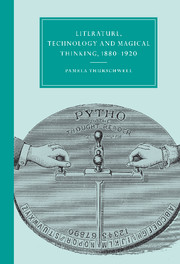Book contents
- Frontmatter
- Contents
- Acknowledgements
- Introduction
- 1 The Society for Psychical Research's experiments in intimacy
- 2 Wilde, hypnotic aesthetes and the 1890s
- 3 Henry James's lives during wartime
- 4 On the typewriter, In the Cage, at the Ouija board
- 5 Freud, Ferenczi and psychoanalysis's telepathic transferences
- Notes
- Bibliography
- Index
- CAMBRIDGE STUDIES IN NINETEENTH-CENTURY LITERATURE AND CULTURE
5 - Freud, Ferenczi and psychoanalysis's telepathic transferences
Published online by Cambridge University Press: 22 September 2009
- Frontmatter
- Contents
- Acknowledgements
- Introduction
- 1 The Society for Psychical Research's experiments in intimacy
- 2 Wilde, hypnotic aesthetes and the 1890s
- 3 Henry James's lives during wartime
- 4 On the typewriter, In the Cage, at the Ouija board
- 5 Freud, Ferenczi and psychoanalysis's telepathic transferences
- Notes
- Bibliography
- Index
- CAMBRIDGE STUDIES IN NINETEENTH-CENTURY LITERATURE AND CULTURE
Summary
We must never let our poor neurotics drive us crazy. I believe an article on ‘countertransference’ is sorely needed; of course we could not publish it, we should have to circulate copies among ourselves.
In the abridged version of the Freud/Jung Letters edited by William McGuire, the first mention of Sandor Ferenczi refers the reader to the following footnote which I quote in full: ‘Sandor Ferenczi (1873–1933), Hungarian ventriloquist; introduced by Jung, he became Freud's close friend and psychoanalytic collaborator’. Since there is no evidence to suggest that Ferenczi was ever employed as a ventriloquist, or that he even practised puppetry as an identity-defining hobby, it seems likely that the footnote is simply a joke at Ferenczi's expense. Unlike some other early analysts Ferenczi was never one of Freud's puppets. He stirred up far too much trouble. However, the title of Ferenczi's final paper, ‘Confusion of Tongues between Adults and the Child’, suggests that the label ventriloquist might adhere to Ferenczi for another reason. Contra Freud, Ferenczi's late theories and practice radically problematize the question of whose desires speak through the subject. In ‘Confusion of Tongues’, Ferenczi returns to Freud's earliest ideas about the traumatic effects of childhood sexual abuse to insist that the child's material experience of abuse and invasion could result in her identifying with, introjecting and even speaking in the voice of the attacking adult.
- Type
- Chapter
- Information
- Literature, Technology and Magical Thinking, 1880–1920 , pp. 115 - 150Publisher: Cambridge University PressPrint publication year: 2001
- 1
- Cited by

